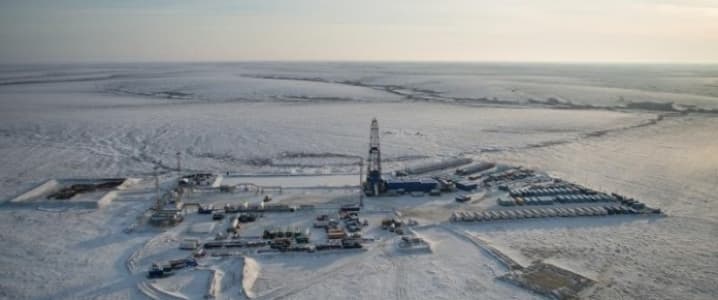Russia has launched the first commercial production at the country’s northernmost onshore Arctic Vostochno-Messoyakhskoy oilfield. The oilfield’s recoverable oil and gas condensate reserves are estimated to exceed 340 million tons of oil and 113 billion cubic meters of gas, according to the information shared by the project’s stakeholders Rosneft and Gazpromneft.
In 2016, production is expected to reach 577, 000 tons of oil, and production peak of 5.6 million tons of oil is projected to be achieved by 2020.
Production started after president Putin officially greenlighted it on September 21, via a teleconference with the Vostochno-Messoyakhskoy oilfield site. The launching ceremony of the largest drilling project in the Arctic was attended by the top executives of Russia’s oil and gas industry giants: Gazprom Chairman of the Management Committee Alexey Miller, Chairman of Gazprom Neft Management Board Alexander Dyukov and: Rosneft CEO Igor Sechin, who took part in the videoconference from the Arctic project site.
Russian president Vladimir Putin pointed out the utmost importance of the project’s launch for the Russian energy industry. “Work on this field started decades ago when the first geological explorations were conducted. This production launch is a huge achievement: the result of a tremendous effort and hard work and expertise on behalf of thousands of industry specialists, most complex sets of technology and large-scale investments that finally got Messoyakhskoy’s oil off the ground and ready for shipment”, Putin stated .
The Vostochno-Messoyakhsky field is located on Gydan Peninsula of Yamalo-Nenetsky Autonomous District of Russia.
The company Messoyakhaneftegaz, a joint venture of Rosneft and GazpromNeft, owns the license for the development of the field.
According to Rosneft, by the end of 2016, investment in the development of Vostochno-Messoyakhskoye oilfield will amount to about 85 billion rubles ($1.32 billion, and is projected to increase up to 256 billion rubles ($3.97 billion) by 2040.
The field’s infrastructure was built in a very harsh climate in less than 3 years, overcoming the location’s remoteness from any industrial and transport sites, with the nearest settlement being some 150 km away. A total of 400 thousand tons of cargo have been delivered to the field by water and by winte roads.
There are currently 51 operational oil wells in the project field, and a 98 km long supply pipeline connects the field to Zapolyarye-Purpe main pipeline. The pipeline is insulated to withstand low arctic temperatures. The oil produced at Vostochno-Messoyakhskoye field is very viscous, and has to be heated at a central oil treatment facility first in order to be transported. The field is equipped with two electric power stations with the aggregate capacity of 90 Mw.
As the Head of Rosneft, Sechin emphasized during the video conference, the most advanced technologies have been used for designing and drilling of the 51 operational wells, including the horizontally inclined wells with side ramifications that have boosted the wells’ yield up by 40 percent. Related: Low Oil Prices Are Not The Reason Oil Companies Are Going Bankrupt
“Rosneft also provided access to advanced technologies utilized while implementing complex projects, such as Vankor, that became flagman production projects of the world oil industry”, said Rosneft CEO Igor Sechin.
The Head of the Russian oil industry giant also put a marked emphasis on the need for reform in the Russian oil industry tax code to allow tax stimulation and tax relief for the oil companies to become more competitive.
“Due to intense competition on global hydrocarbon markets it is of vital importance for the Russian oil and gas industry to maintain production and bring new fields into production. The field that launched today required RUB 250 billion worth of investment. In such conditions, the industry requires tax stimulation so that we could be competitive on the world markets. We believe that the tax privileges under review should contain universal approaches based on reservoir qualities, oil physical and chemical qualities, field water cut level and infrastructure availability”, stated Sechin.
As Gazprom’s Chairman Alexey Miller stated during the ceremonial launch, up until 2040 the oilfield operations will generate aggregate tax revenues worth 1 trillion rubles that will be paid to multiple Russian budgetary funds.
However, the project economics may take a turn for the worse in the wake of the taxation changes proposed by the Russian Ministry of Finance. Related: Is The Next Shale Boom About To Unfold In Mexico?
According to the proposed plan, oil export duties may be abolished but the mineral extraction tax (MET) may be increased, and the burden of excise tax may be shifted to refineries with a smaller rate of tax returns, as was reported by government officials to Vedomosti.
Annulment of tax duties payment will nullify tax privileges.
An oil company employee told Vedomosti that such a tax maneuver is not acceptable to the oil industry, as it will lead to an increase in the amount of taxes applied.
“Production at key oilfields of Western Siberia declines at the rate of 3 per cent a year, although the production cost is extremely low: $2 US per barrel. The output declines because there is no effective, stimulating tax regime, and instead of creating one, the authorities do everything on the contrary,” the source said regretfully.
According to another source from Gazpromneft, who preferred not to disclose his name, if no benefits from taxes are introduced, the oilfield will be profitable only at the price over $100 per barrel
According to an analyst from Sberbank-CIB Valery Nesterov, if the tax burden on Vostochno-Messoyakhsky oilfield increases, the shareholders may postpone capital expenditures and put off the projected timing of reaching production plateau.
“If the tax regime remains unchanged, by 2019 the Russian oil industry output may exceed 570 million ton“, the analyst concluded.
By Ekaterina Prokovskaya for Oilprice.com
More Top Reads From Oilprice.com:
- Oil Rises, Skepticism Too, As OPEC Meets To Talk Output Deal
- Niger Delta Avengers Blow Up Oil Pipeline Again
- Russia And Saudi Arabia Playing A Risky Game Ahead Of OPEC’s Meeting


















